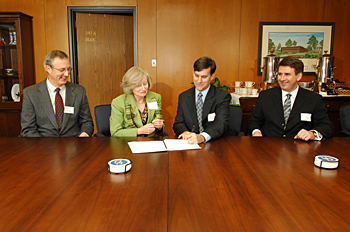
The agreement was signed on Dec. 5 during a ceremony that was attended by UD Provost Dan Rich and Betty Paulanka, dean of the College of Health Sciences, Jim Richards, associate dean for research in the College of Health Sciences, Steven Stanhope, professor in the College of Health Sciences and former director of the Physical Disabilities branch of the National Institutes of Health (NIH), and C-Motion representatives W. Scott Selbie, director of research and development, and John Kiser, president, among others.
C-Motion was created in 1997 to facilitate the technology transfer of Move3D motion analysis tools from the physical disabilities branch of the NIH into the commercial market. One of the products that resulted from this effort is Visual3D, the most advanced three-dimensional (3D) analysis software available for biomechanical modeling and motion analysis using kinematics and inverse dynamics (kinetics), which was released commercially in mid 2001. C-Motion has since expanded its scope to address the needs of the medical research and rehabilitation communities with quality assurance products, consulting and research support services.
The “luminary site agreement” will promote the University's culture of discovery and innovation through a symbiotic relationship between student education, research, globally directed training, technological innovation and career skill development focused on a globally oriented research and education experience, Stanhope said.
“Research conducted by staff and affiliates of the University of Delaware under this agreement will include critical systems goals and breakthrough fundamental knowledge and technology barriers in the field of human movement modeling, analysis and simulation,” Paulanka said. “The agreement is aimed at promoting a high-quality cross-disciplinary research program that addresses technological barriers through fundamental research and enabling and University-based systems level research and proof-of-concept test beds.”
The agreement defines an administrative procedure for the development, documentation, approval, support, execution and periodic review of educational activities, research projects and training initiatives.
“This very distinctive partnership is possible because of UD researchers working in collaboration with colleagues from a very innovative sector in the industry,” Rich said. “It exemplifies the kind of knowledge-based partnerships that the University is committed to enhancing in the years ahead.”
Paulanka said, “the College of Health Sciences is working to facilitate the University's recognition as a center of excellence in rehabilitation biomechanics and human movement analysis.”
“The general goal for an emerging Institute of Human Health and Rehabilitation is to accurately predict the effects of disease, injury and treatment on an individual's ability to perform routine, valued or desired activities. Achievement of this goal relies entirely on the capacity to execute multidisciplinary trans-domain rehabilitation research,” Stanhope said.
The collaborative research will be geared toward understanding the complex relationship that relates impairments of the neuromusculoskelatal system to functional movement limitations and the onset of physical disabilities.
“This knowledge is useful clinically to help establish rehabilitation treatment goals and to select rehabilitation treatment interventions,” Paulanka said. “In addition, planned activities under this agreement will enhance clinical research studies conducted at UD and its affiliates, support rehabilitation research efforts, provide outstanding rehabilitation research training opportunities and facilitate the coordination of inter-departmental disability research related efforts.”
Article by Martin Mbugua
Photo by Kathy F. Atkinson

